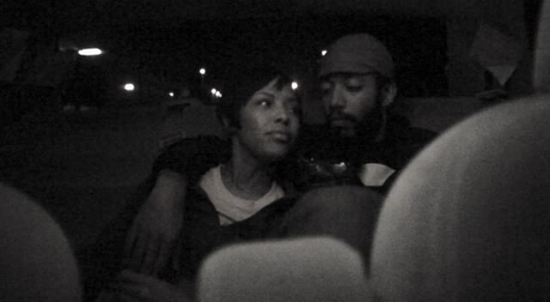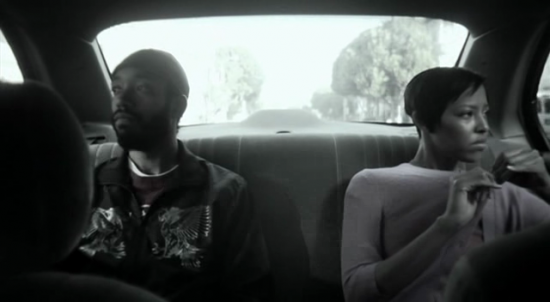Director: Barry Jenkins
Writer: Barry Jenkins
Stars: Wyatt Cenac, Tracey Heggins and Elizabeth Acker
Medicine For Melancholy is a film that shows a young filmmaker’s zeal and commitment to the art and craft of filmmaking. Barry Jenkins’ quest and pressure to deliver something serene, poignant and sophisticated is commendable. All the elements – wind, water, earth and fire – seem present and ready to propel the story into emulating such films, as those from the Captain Planets of filmmaking – the Laurent Cantets, the Derek Cianfrances and Mr. Jenkins’ own Claire Denis.
Nonetheless I still remain, perhaps in my humble belief, the black filmmakers toughest critic. I can’t help it.
Medicine For Melancholy has a story albeit a great one. It is structured enough and it is filmed with a humble comprehension of the art. You can tell a lot of thought went into making this indie picture. The color de-saturations achieve something out of the ordinary for a movie that explores the lives of two young black folk in San Francisco’s Nob Hill.
Micah (Wyatt Cenac) and Joanne (Tracey Heggins) wake up next to each other in bed. They are hung over and they don’t know each other’s names. She wants to go home to forget, but she doesn’t want to. She keeps staring at Micah, who’s now freshening up in the bathroom. She joins him. The mood is tongue-tied and the ambience stupefying. He doesn’t know what to do or say, probably wondering how he got a nice chick like that in bed.
Eventually they walk out of this expensive San Francisco apartment. He asks her to breakfast, rarely trying to persuade her in an excruciatingly boring manner. She obliges anyway. Immediately, you know she has nowhere to go. Her life must be boring as well. But we don’t know for sure. So you keep watching. You really want to find out why Jo’ wants to hang around Micah. She doesn’t say much, coming off as standoffish in the beginning exchanges at breakfast – I want to know you and I don’t want to know you sort of attitude – or better yet, playing hard to get for the second round. It is as though she gave something to him that she wants back. Otherwise she can’t leave. Tracey Heggins plays this part acceptably and you know staight-away that – what you are watching is called Melancholy.
So does Wyatt Cenac’s (Micah) equally interesting role of super boring. It beats my imagination. He is awkward, at one point, jumping up and down like a 4 year old until Jo’ would give him the permission of a frantic mother, “well, go pee.” Immediately, it dawns on you that this movie is more about her than about Micah – what she is going through, what her struggles are – and why she is here. I could only admire Barry Jenkins for keeping me this entertained.
At every turn, I wondered why on earth Jo’ was hanging around this agonizingly boring dude. Is he her type? So when she finally pursed her lips and spat out the inevitable, “This is only a one night stand,” and walks away, man, I was relieved! Finally! Gaddamn it!
But seconds later she is smiling again, mounting a toy horse carousel and Micah sprinting in her direction, cracking an excruciating smile. The whole scene was startling. It poked at my heavy heart. Are they love birds now? In just 2 seconds? How? Then, I knew the movie was not about to end anytime soon.
I never gave up! And the story continued along a path that sought more so to educate you on race problems, demographics in San Francisco and gentrification, than to explore the lives of these two folks. The film drops in on completely unrelated topics – a discussion group about housing policy; something about Maya Angelou; February and Black history month; some African music; a museum visit that was full of education, documentary and commentary – and you wonder, where is ‘ma movie?’
Not that you cannot educate through drama and entertainment. But subtlety is the bulwark of such films, so we don’t loose sight of the whole purpose of the motion picture. Otherwise, write a book. The question is, ‘how do you turn inherently boring and un-cinematic topics on social issues like race relations, demography, sociology of the family, and gentrification into dramatically picturesque and exciting films?’ 4 Months, 3 Weeks and 2 Days (2007) is a sufficient example – a woman who assists her friend to arrange an illegal abortion in 1980’s Romania. Our own Crash (2004) also springs to mind. But my classic example is Entre Le Murs (The Class, 2008).
That leads me to my overarching point. What is the theme in Medicine For Melancholy? Gentrification? Race? Identity? Interracial relationships? One night stand issues? Embarrassment? Loneliness? Black heroes and Events, like Maya Angelou and February? What is the overarching theme? You can’t exactly say. The movie was overloaded. Unless you are Fredrick Wiseman, in which case, you make a 12-hour documentary film! Which is probably why a film that started off with immense potential succumbed to the intense pressure that most young directors suffer these days – to make intelligent movies.

Though Medicine For Melancholy attempts to approximate a documentary on the throes and woes of living poor and black in a predominantly white San Francisco, it fails at invoking – for any particular theme – the necessary emotional focus, psychological thrill and cinematic depiction of a social ill that should have been indicative of the Melancholy surrounding their lives and the fast changing face of San Francisco.
More than anything, I wanted to understand Jo’s transfiguration – from skittish to playful – and her vacillation between the two. I wanted to see why she was torn between going home and hanging out with the agonizingly boring Micah. I wanted to know what made her tick, stay and what made her accommodate Micah.
Afterall, she was the one cheating. Micah wasn’t. And it’s not enough to have her boyfriend call from a distant land. Maybe she had never dated a black guy? Something we may come to conclude – in a city with a 7% black population – that she sees Micah as an intriguing, single, hip black man in what they describe as the indie world?
Undoubtedly, Jo’ was the more complex character and her storyline, had it dominated, Medicine For Melancholy would have been a class act. As when in the final scenes she walks off, hails a taxi, and takes off leaving Micah behind, you want to believe she had changed. You want to believe that at long last, the character had evolved. But then the taxi eases to a stop in the middle of the street – at a distance – and the drunk and painfully boring Micah runs up to catch it. I felt bad for her, I felt sorry for a poor girl wanting a place to belong. And why?
That’s where Medicine For Melancholy leaves you shortchanged and perhaps the reason for its charm. Still, in its final analysis, it is miles ahead of many indie films I have seen lately, I Will Follow, being one such example. It is better than Jumping The Broom. Hands down!
I only wish the last third of the movie was better and the character arch more defined for Jo’. However, according to this ending I may conclude yet again for my own sanity, that maybe Jo’s Melancholy was so deep, and the boredom that came with Micah, enough Medicine to sooth the darkest parts of her life. She needed him – for whatever she was going through. If this were the case, then Barry Jenkins would have achieved a feat in his first film.
But why would she sneak out on him – in the end? Why? I keep scratching my head.










